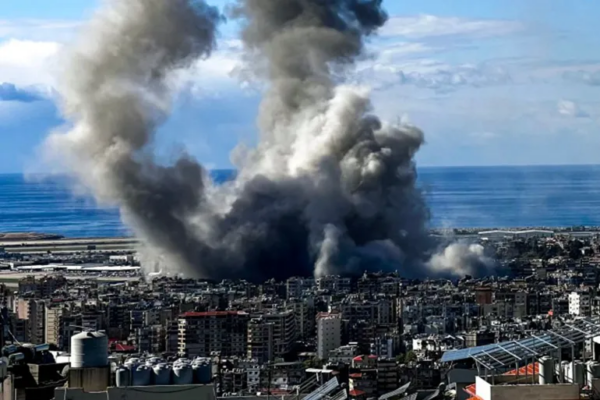Smoke rises from the site of an Israeli air strike that targeted Beirut’s southern suburbs on November 26 [Ibrahim Amro/AFP]. The ceasefire between Lebanon and Israel went into effect at 4 am Wednesday November 27
The ceasefire agreement between Israel and Lebanon went into effect at 4:00 a.m. on Wednesday morning, hours after the Israeli Cabinet on Tuesday evening approved the ceasefire deal, which was brokered by the US, by a majority of 10 to 1.
Israeli Prime Minister’s Office stated, “The Security Cabinet, this evening (Tuesday, 26 November 2024), in a 10-1 vote, approved the US proposal for a ceasefire arrangement in Lebanon. Israel appreciates the US contribution to the process, and maintains its right to act against any threat to its security.”
“Prime Minister Benjamin Netanyahu, this evening (Tuesday, 26 November 2024), spoke to US President Joe Biden and thanked him for the US involvement in achieving the ceasefire agreement in Lebanon and for the understanding that Israel maintains freedom of action in enforcing it,” the PMO said.
As was widely expected the only minister who voted against the proposal was National Security Minister Itamar Ben Gvir.
“The Cabinet’s decision tonight is a serious mistake. A ceasefire at this stage will not return the residents of the north to their homes, will not deter Hezbollah, and will in fact miss a historic opportunity to deal them a hard blow and bring them to their knees,” Ben Gvir said.
Finance Minister Bezalel Smotrich, a member of the Security Cabinet, said on Tuesday night, “Tomorrow at 4:00 a.m., the greatest test of the Israeli government begins, perhaps one of the greatest tests of Israeli governments in general. If we pass it, we will have secured Israel’s security forever. I voted in favor because I believe we will. My demands for the necessary conditions to be enshrined in the body of the decision were accepted and I pledge to continue to be there on guard, for you, until victory and the restoration of security.”
Netanyahu addressed the nation about the ceasefire on Tuesday evening. “I promised victory and we will achieve victory. We will complete the elimination of Hamas, the return of all our hostages and the return of the residents of the north,” he said.
We have destroyed significant parts of Iran’s air defense and a significant component of its nuclear program,” he added.
Netanyahu added, “This evening, I will bring before the Cabinet a ceasefire plan. How long it will be depends on what will happen in Lebanon.”
“If Hezbollah doesn’t follow the agreement, we’ll attack,” he said. “If it’s going to try to build up terrorist structures near [the border] or if it brings a truck with missiles, we’ll attack.”
According to the agreement Israel and Lebanon will recognize the importance of UN Security Council Resolution 1701, even though, “these obligations do not negate Israel’s or Lebanon’s inherent right to self-defense,” the agreement states.
According to the agreement, Lebanon’s Army and security forces will be the only armed groups authorized to carry weapons or operate military forces in southern Lebanon. “Any sale, supply and production of weapons or arms-related materials to Lebanon shall be under the full supervision and control of the Lebanese government,” it underscores.
The agreement also stated that, “All unauthorized facilities involved in the manufacture of weapons and arms-related materials will be dismantled, all military infrastructure and positions will be dismantled, and all unauthorized weapons that do not comply with these obligations will be confiscated.
A committee agreed upon by Israel and Lebanon will be established to monitor and assist in ensuring the enforcement of these obligations. Israel and Lebanon will also report on any possible breach of commitment to the Committee and to UNIFIL.
Lebanon will also deploy its official security forces and military forces along all borders, crossing points, and the line that defines the southern area, as presented in the deployment plan.
Israel will gradually withdraw its forces to south of the Blue Line over a period of up to 60 days. The United States will simultaneously promote indirect negotiations between Israel and Lebanon in order to reach a recognized land border.
“The fighting across the Lebanese-Israeli border will end — will end. This is designed to be a permanent cessation of hostilities,” US president Joe Biden said when announcing on Tuesday night that an agreement had been reached.
“Civilians on both sides will soon be able to safely return to their communities and begin to rebuild their homes, their schools, their farms, their businesses and their very lives,” Biden said.
Hezbollah, which did not participate in any direct talks on the ceasefire – with Lebanese parliamentary speaker Nabih Berri mediating on the group’s behalf – has yet to formally comment after Biden made the announcement but prior to the announcement Hassan Fadlallah, a Hezbollah MP, told Reuters in that Hezbollah would remain active, including in providing social services to displaced Lebanese civilians. Fadlallah called the final hours before the ceasefire “dangerous, sensitive hours,” given that the IDF launched a large-scale attack on Beirut earlier on Tuesday.
Lebanon’s caretaker Prime Minister Najib Mikati said he told Biden that he welcomed the deal to end hostilities between the Lebanese armed group Hezbollah and Israel.
Updates: Al-Jadeed TV reported that “the international committee to monitor the ceasefire agreement will consist only of US and France after Lebanon refused to include Britain and Germany.”
Israel National News 7/ News agencies

